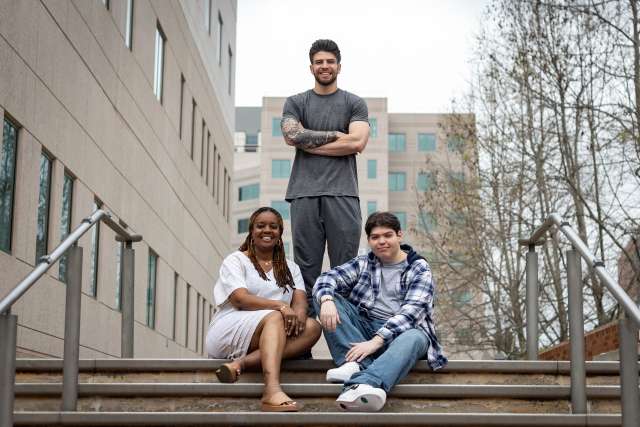Computer-assisted interviews are improving the accuracy of data collected in HIV/AIDS research in Africa. |
With nearly 23 million people across the African continent living with HIV/AIDS, public health experts across the globe are working feverishly to stem the epidemic. Among them is UCLA's Pamina M. Gorbach, a behavioral epidemiologist whose research recently took her to Malawi, where 10 percent of the population lives with HIV/AIDS, the leading cause of death in that country.
As part of a study of the effectiveness of new HIV-prevention medications, called microbicides, Gorbach, a professor in the Department of Epidemiology at the UCLA Fielding School of Public Health as well as the Division of Infectious Diseases at the David Geffen School of Medicine, explored the use of a new high-tech approach to interviewing the study's 585 women research subjects. The study, which was reported in the journal AIDS and Behavior, used Audio Computer-Assisted Self-Interviewing (ACASI), a technology developed by epidemiologists in the U.S. Population Council, which conducts biomedical, social science, and public health research, to obtain information on sensitive subjects like sexual behavior and drug use.
| Professor Pamina Gorbach |
Gorbach and her research team found that the women in the Malawi study reported that they preferred to do an audio "interview" with a handheld ACASI device compared to a face-to-face interview. Particularly significant to researchers, the participants were likely to give more honest and accurate responses in a computer-assisted interview than when asked the same questions face-to-face by a human interviewer.
Perhaps these results aren't so surprising, given such deeply personal interview questions as "In the past three months, how many sex partners have you had?," "Have you had anal sex?" and "The last time you had vaginal sex, did you use study gel [the experimental microbicide] or a condom?" While questions like these must be asked to enable a better understanding of HIV/AIDS transmission and prevention, Gorbach said that "sensitive or "socially undesirable" sexual behaviors are known to be underreported, while socially desirable behaviors such as adherence to taking medication or using condoms tend to be overreported. The ACASI interviews in Malawi, conversely, produced higher reports of sexual behaviors and lower reports of adherence - results that, Gorbach noted, "support the assumption that [computer-assisted interviews] can improve the accuracy of the data."
Enhancing the user-friendliness of this approach, the audio devices were programmed to ask the interview questions in the local Chichewa language - one of 21 languages and dialects in which the software can be programmed. The devices also incorporated images to improve comprehension for women with low literacy levels.
Images enable participants with low literacy levels to respond to the questions. |
"The incorporation of graphics for non-literate participants was an important element in customizing the ACASI application," said Gorbach. For example, for the question about the number of sexual partners, an interactive screen depicting a man's face allowed for reporting more than one partner. Each time a participant tapped the image on the screen in response to this question, a new face appeared to indicate a different partner. Because of these images and the audio, a participant did not need to be able to read the question or response options.
The handheld devices have the capability of transmitting data wirelessly via the Internet, but given limited Internet access in Malawi, the devices were set to record the subjects' responses on built-in digital cards. Data from the cards were seamlessly transferred to a data manager computer that researchers could then use for analysis and completion of the study.
Gorbach, whose international research has also taken her to the African countries of Mali, South Africa and Ghana, as well as to parts of South America and Indonesia, is a forerunner among researchers using ACASI. She is also sharing her knowledge in public health classes, where her tech-savvy students will no doubt make their own contributions to advancing its use among epidemiologists worldwide.
____________________________________________
This story is based on a briefer version originally published in the Fielding School of Public Health Magazine.
Judy Lin and Dan Go



